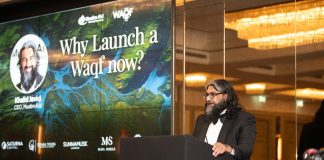30 November saw the humanitarian charity Muslim Aid mark its 39th anniversary with a special event bringing together influential figures from the Muslim community, including prominent politicians, business leaders and philanthropists.
Celebrated with a special dinner event held at an exclusive hotel in Central London, the packed event served as a call to action to raise money and awareness for its fight against injustice and poverty.
The event also marked the launch of the Waqf endowment fund, a scheme aimed at providing sustainable support to help those in need and empower communities, both abroad and in the UK.
The CEO of Muslim Aid Mr Khalid Javid commented: “The launch of our Waqf marks a significant step in futureproofing our charity’s work.
“Through this endowment, we are creating a sustainable source of funding that will allow us to respond effectively to urgent needs and invest in long-term solutions for communities facing adversity. We are excited to see the positive impact this will have on our projects in the UK and internationally.”
The evening not only reflected on the charity’s years of dedicated work to fight poverty, provide emergency relief wherever it is needed, and help with development in poor communities but also looked forward to reaffirming its commitment to the desperate issues both now and in the future.
Speaking exclusively with Asian Standard, CEO of Muslim Aid Khalid Javid outlined how the new fund represents the values and legacy of the charity, and also how their work helps fulfil the Islamic principles of giving to those in need, not just today but into the future.
“The Waqf will outlive every single one of us – because it is a way of continually giving. If it is 50 years or one hundred years, your donation your donation will be worth considerably more than whatever you donate on the day.”
He continued to discuss if he thought the event was a success: “It was an amazing success. Everyone that I spoke to came away with a better understanding of both the Waqf and Muslim Aid. The event was the result of the blood sweat and tears of our hardworking organisers.
“Approximately £130,000 was raised on the day – and even a flat was donated by an anonymous donor.”
Mr Javid also discussed the important work of Muslim Aid in areas such as Gaza, Sudan and other regions across the globe – and also here in the UK.
“We are working with schools, the NHS, mental health institutions, and the necessities because winter is just around the corner. We are looking after homeless people making sure that they have the essentials that they need.
“Next year we will be working with our partners to deliver 12 million hot cooked meals in and around London.”
Khalid was keen to express how the work of the charity is formed of and demonstrates key Islamic values: “We stand by our values of dignity, service and respect. We strive to work towards excellence in everything that we do. Charity never decreases your wealth!”
A key focus of the night was also Muslim Aid’s new initiative – the Global Waqf fund. Speaking exclusively with Asian Standard to explain this was Umer Suleman – an Islamic Finance Specialist, who studied at Harvard University and also held a senior position at HSBC.
He explained: “Waqf, in essence, is a perpetual endowment.
“Waqf is something which is held. It cannot be owned privately, it’s for public use. For example, historically maybe a piece of land is given. Anything grown on the land was set aside purely for charity.
“It is an endowment – one that continues long after the donors have passed away, doing good on their behalf.”
He went on to discuss his perspective on the work of Muslim Aid: “Muslim Aid is phenomenal – a real institution in the Muslim community for almost four decades now. We see around the world that there are people that need help, and we have a responsibility to help them.”
“What the Waqf will do is super change this by giving them sustainable income in the long term. The need has only increased over the years.
“What this will do is instead of having to do fundraising each time there is an emergency, they can build up a pot that they can always have available to distribute the aid needed.
“If you have a smooth and continual form of income it allows you to be strategic – for example, we can build this orphanage here or complete this project, and next year we can do even more. It allows the charity to plan.”

Also at the event was Naz Shah, MP for Bradford West, who is also Chair of the All-Party Parliamentary Groups on Islamic Finance, amongst other high – profile roles in government.
She explains why she felt the event was important: “I think it’s important for many reasons. One reason is that it marks 39 years – just before the big four – 0!
“The second reason is the launch of the endowment fund today – that is massive. To have a Waqf from Muslim Aid now in the times that we are in globally.
“If you feed a man a fish he survives for a day, you teach him how to fish and he survives for a lifetime.
“The key to the endowment is about helping people for sustainability in the long term – not just handouts, so we can support true global development.
“It is looking to what Muslims do well, which is both help at points of crisis and support long-term development.
“Muslim Aid and similar charities have a huge role to play in being complementary to government. The government can never fix everything. Britain has a strong history of charities that work for the betterment of society.
“It’s important to have these networks across society.”
Muslim Aid looks to the future of using the new Waqf fund to help those in need in a sustainable and long-term way and encourages donors and supporters to join them in their work.




